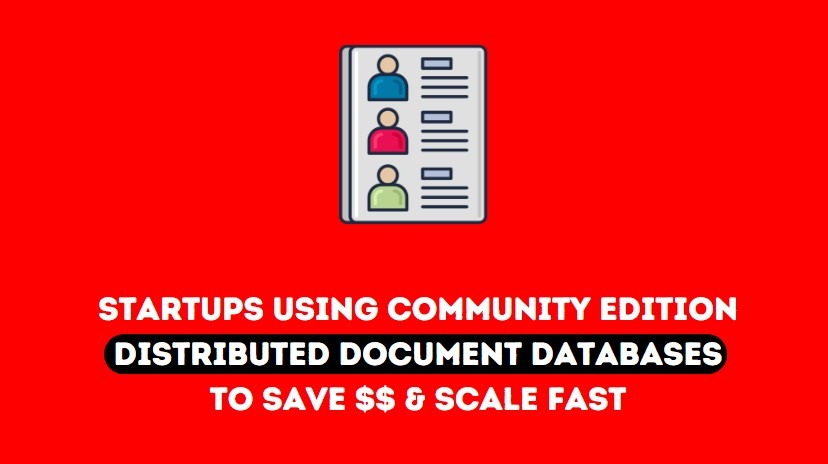
The landscape of technology startups changes non-stop, and the effective use of data plays a pivotal role in achieving success. Databases are a fundamental part of this strategy, as they serve as the backbone for data management. We previously highlighted databases here on Startupnoon.com as a part of the modern tech stack structure. They make collecting and interpreting data possible, allowing you to form valuable insights that can guide strategic business choices.
For startups operating on a tight budget, however, the expenses associated with implementing and upkeeping top-tier database solutions can be a significant hurdle. This is where community edition distributed document databases can help. They offer a robust and cost-effective resolution for handling large volumes of data generated by tech startups.
Community Edition Distributed Document Databases and Their Advantages for Tech Startups
Advantages listed below:
Flexibility: Boosting a Tech Startup’s Dev Performance
To understand how a community edition distributed document database can help your business scale, you must first be familiar with its characteristics. The term ‘community edition’ generally refers to a type of database that is open source and can be distributed across multiple nodes for scalability and availability.
As a document database, it stores data in documents, which are flexible data structures that can contain a variety of fields and nested data. A commonly used database of this type is the MongoDB Community Edition, which features ad-hoc query support, as well as real-time aggregations that help with accessing and analyzing data. It is different from the more popular MongoDB Atlas, which is a cloud-based fully managed database. Dev teams in tech startups have the option to build projects using the MongoDB Community server or try MongoDB Atlas products to get a better sense of the two models. Unlike the latter, however, the MongoDB Community Edition can be hosted on a local machine.
As it is also open source, users can access and manipulate the source code offline using a tool like Visual Studio Editor. A community edition distributed document database is ideal for applications that require high performance and flexibility. Tech startups benefit from both qualities as a lot of such companies process tons of data, from end-user information to R&D files. As an example, the MongoDB Community server has been instrumental starting from the early days of companies like Uber, Slack, and Yelp. It has and still enables them to manage massive amounts of data and deliver seamless user experiences.
Cost-Effectiveness: The Driving Force for Startups
Another advantage of community edition distributed document databases is their cost-effectiveness. As they are typically free to use and modify, the setup can eliminate a significant financial burden for a tech startup. As a result, you can allocate limited resources towards other critical aspects of the business such as innovating products or solutions.
Scalability: Accommodating Much-Needed Growth
Startups are inherently dynamic entities, often experiencing rapid growth and fluctuating data volumes. Community edition distributed document databases excel in accommodating this dynamic nature, as they can offer horizontal scalability. This means your tech startup can seamlessly add more nodes to your database infrastructure as your data needs increase. Nibusinessinfo.co.uk explains that a well-built database system ensures it can keep pace with your growth initiatives.
For instance, Jay Geater previously discussed the benefits of using bulk email to accelerate sales. This strategy works better if your startup’s database infrastructure has enough bandwidth to accommodate all the necessary user information and data transactions.
Versatility: Empowering Data-Driven Insights
Community edition distributed document databases are not merely data storage solutions; they are powerful tools that enable startups to extract valuable insights from their data. These databases support flexible data structures, such as documents and JSON, which can accommodate a wide range of data types and complexities. This flexibility empowers tech startups to store and analyze complex data structures, fostering innovation and enabling data-driven decisions. CouchDB is a good example in this scenario, as it has played a vital role in the development of social media platforms like Instagram and Reddit. The system allows them to work with different data types to facilitate real-time data updates and enable engaging user interactions.
Data Availability: Ensuring Uninterrupted Operations
In the competitive tech landscape, downtime is simply not an option. Community edition distributed document databases provide exceptional availability with their distributed architecture, ensuring that critical data remains accessible even in the event of node failures. This resilience is crucial for a tech startup, preventing disruptions to operations and protecting your reputation for reliability.
Community Support: A Collaborative Ecosystem for Success
Community edition distributed document databases benefit from supportive communities of developers and users. Tech startups can tap into this collective knowledge to seek assistance, troubleshoot issues, and learn best practices. This collaborative ecosystem fosters innovation and accelerates problem-solving, further empowering your company to leverage your system’s full potential.
Community edition distributed document databases have improved access to robust data management solutions, empowering tech startups to compete effectively in their niche. The flexibility, cost-effectiveness, scalability, versatility, availability, and community support of these tools make them an invaluable asset for startups. With proper use and maintenance, these components let you harness the power of data to drive innovation, growth, and success.
Be sure to check out the latest on our Learn section to get more tips on building your business.



